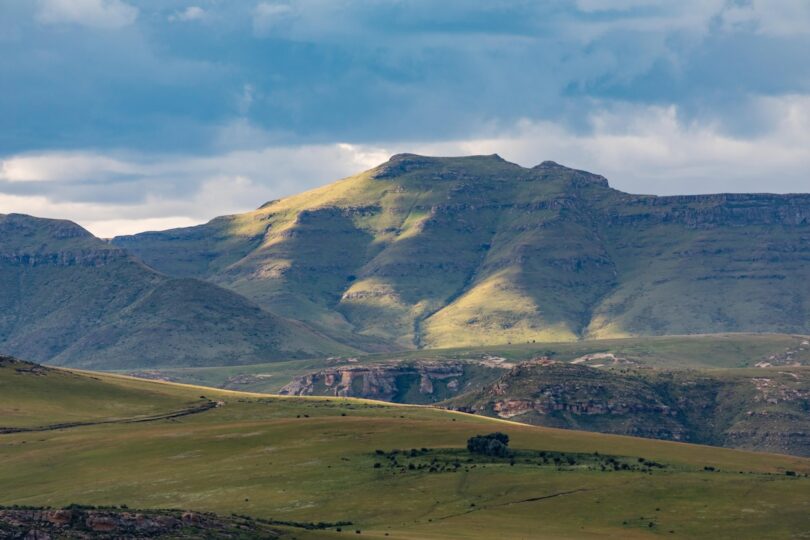South Africa is a country of rich biodiversity. It is home to nine biomes, two of which- the Cape Floral Kingdom and the Succulent Karoo- are internationally recognised biodiversity hotspots. Sadly, many of South Africa’s diverse landscapes have become degraded and fragmented primarily due to unsustainable development and poor management. The impacts of climate change are also increasing the risk of biodiversity loss.
WWF South Africa works to look after the country’s natural resources so everyone can continue benefiting from healthy ecosystems and their services. They are addressing the declining biodiversity of the country by expanding protected areas and reconnecting people to the land. This will have benefits for both humans and the environment.
The Eastern Cape, where WWF are currently working on a new Grasslands National Park project.
The Link Between Biodiversity and Climate Change
Climate change has altered landscapes across the globe. It has caused the extinction of many plants and animals, increased disease and changed species distribution. Human health is also affected by reduced ecosystem services, such as the loss of food, medicine and livelihoods provided by nature.
Biodiversity is the variety of life on Earth. Scientists have estimated that there are around 8.7 million species of plants and animals, many of which have not yet even been discovered! Maintaining biodiversity is essential; it increases the resilience of ecosystems and buffers the impacts of climate change.
WWF, Senior Manager: Land and Biodiversity Stewardship Programme, Angus Burns, spoke to the point:
“Climate change is a major driver of biodiversity loss whilst the loss of biodiversity accelerates climate change processes. Climate change also increases the risk of extinction and impacts the ability of ecosystems to regulate provisioning services such as water. We need to fight to sustain biodiversity because it is one of the strongest forms of natural defence against the impacts of human-accelerated climate change.”
Protecting South Africa’s Biomes
WWF South Africa has dedicated programmes of work focusing on securing refugia for biodiversity by expanding national parks and other conservation areas such as private and provincial nature reserves and protected environments. Only the most biodiverse land qualifies for inclusion in these initiatives, and the work aligns with the government’s national protected area expansion strategy. They aim to reconnect people to the most valuable and vulnerable landscapes, namely in the Grasslands, Succulent Karoo and Fynbos biomes, and assist with expanding protected areas to benefit people and nature.
Burns expanded on the work they’re doing at WWF to conserve biodiversity across South Africa:
“We also have a dedicated climate programme that promotes the national transition to net zero by 2050 and catalyses innovation and transformation towards a low-carbon, climate-resilient economy with pathways to a Just Energy Transition. Since biodiversity and climate are interconnected, it is just as important that we focus on climate mitigation measures. These two areas of work will ultimately enable mutually beneficial outcomes.”

Photo by Angus Burns/WWF South Africa
Why Are National Parks Important For Biodiversity And Our Fight Against Climate Change?
National Parks and other conservation areas act as refugia for biodiversity, enabling greater opportunities for climate change adaptation and resilience. Biodiverse systems give nature a better chance of adapting to changing environments. The impact of human-accelerated climate change causes a shift that is often too fast for most species to adapt to. However, the greater the biodiversity in an area, the better the chances for adaptation to occur in some form.
South Africa has 19 National Parks, covering over 4 million hectares. These are protected and managed by SANPark. SANParks is a close partner with WWF South Africa. Together, they have been working to expand the national parks to assist the government with meeting national protected area targets and including more biodiversity-rich land into valuable national assets.
Burns explained:
“National parks offer people the opportunity to directly enjoy our country’s unspoilt natural heritage whilst acting as large, landscape-scale habitats for biodiversity and the ecosystem services they provide. Connectivity between national parks and surrounding well-managed landscapes offers more opportunities for biodiversity to persist and flourish. Ultimately, people benefit from this too because of biodiversity’s myriad ecological services, which sustain us as humans, such as water production, pollination, carbon sequestration, nutrient cycling and air pollution mitigation.”
Will South Africa Adapt?
We know that combating climate change will only be possible if we all work together and make bold changes to how we live and grow our economies. It is up to each one of us to value and protect nature’s biodiversity. South Africa has a unique mix of ecosystems that will shape how it adapts to the changing climate. The more diverse and thriving these ecosystems remain, the more successful they will be in contributing to the fight against climate change. National Parks should be treasured as safe havens and expanded where possible to give the people of South Africa the greatest chance of preserving everything their country has to offer.

Photo by Angus Burns/WWF South Africa
Burns concluded:
“Our mega-diverse country may well be the saving grace for us on the African continent (and indeed globally), but only if we all strive to cherish the biodiversity that sustains- whilst also changing our habits to be less reliant on fossil fuels! The establishment and continued growth of our national parks are a significant way to achieve this.”
Time will tell how well South Africa’s ecosystems adapt to these challenging changes!







